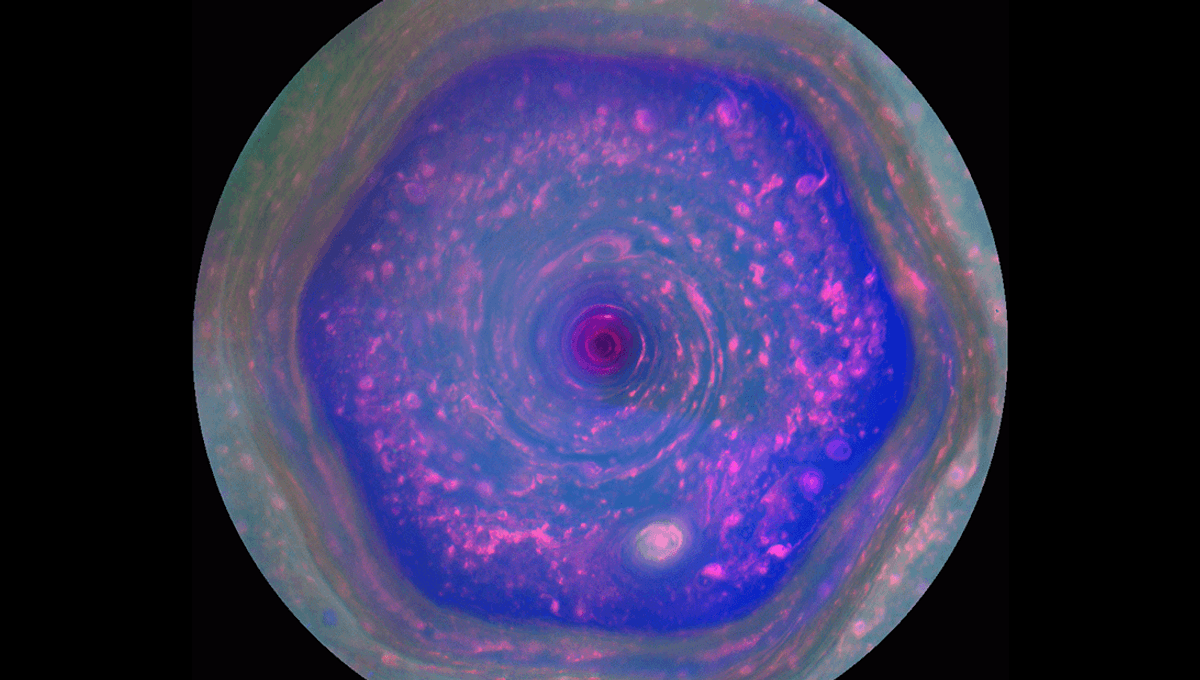-
Новости
- ИССЛЕДОВАТЬ
-
Страницы
-
Статьи пользователей
-
Форумы
"Completely Unexplained" Dark Beads And Star-Shaped Structure Seen In Saturn's Atmosphere By JWST

"Completely Unexplained" Dark Beads And Star-Shaped Structure Seen In Saturn's Atmosphere By JWST
The JWST has found "dark beads" and unexpected structures inside the atmosphere of Saturn – strange features never seen before in the Solar System.
The rest of this article is behind a paywall. Please sign in or subscribe to access the full content. On November 24, 2024, the JWST turned to observe Saturn for 10 hours, seeing the gas giant in unprecedented detail in the near-infrared spectrum. An international team looking at the data from the telescope was particularly interested in infrared emissions by hydrogen-3, or tritium, which plays a key role in reactions within Saturn's atmosphere, and so could be used to inform us about its chemical and physical processes. As well as observing these H3+ ions in Saturn's ionosphere, the telescope observed methane molecules in the stratosphere below that. The team tracked these molecules over the 10 hours of observations, finding they revealed unusual structures, including a series of dark bead-like features and an odd, star-shaped structure in the stratosphere, with four of the six arms visible extending from the north pole down to the equator. A strange, star-shaped feature with four of six arms visible in Saturn's stratosphere. Image credit: NASA/ESA/CSA/Stallard et al 2025 "This opportunity to use JWST was the first time we have ever been able to make such detailed near-infrared observations of Saturn's aurora and upper atmosphere. The results came as a complete surprise," Professor Tom Stallard of Northumbria University explained in a statement. "We anticipated seeing emissions in broad bands at various levels. Instead, we've seen fine-scaled patterns of beads and stars that, despite being separated by huge distances in altitude, may somehow be interconnected – and may also be linked to the famous hexagon deeper in Saturn's clouds. These features were completely unexpected and, at present, are completely unexplained." Though the structures are quite unexpected and remain unexplained, the team believes that they may be related to Saturn's hexagon, a swirling storm in the form of a gigantic and stable six-sided cloud pattern above the planet's north pole. This type of storm has not been seen on any other plants, and scientists have struggled to recreate the shape in a lab. Saturn’s ionosphere, showing the dark bead-like features. Image credit: NASA/ESA/CSA/Stallard et al 2025 “We think that the dark beads may result from complex interactions between Saturn's magnetosphere and its rotating atmosphere, potentially providing new insights into the energy exchange that drives Saturn's aurora. The asymmetric star pattern suggests previously unknown atmospheric processes operating in Saturn's stratosphere, possibly linked to the hexagonal storm pattern observed deeper in Saturn's atmosphere,” Professor Stallard explained. “Tantalisingly, the darkest beads in the ionosphere appear to line up with the strongest star-arm in the stratosphere, but it’s not clear at this point whether they are actually linked or whether it’s just a coincidence.” The team hopes that further observations using JWST could help shed light on these strange structures and their cause and effects. “Saturn's upper atmosphere has proven incredibly difficult to study with missions and telescope facilities to date due to the extremely weak emissions from this region,” Stallard added. “JWST's incredible sensitivity has revolutionised our ability to observe these atmospheric layers, revealing structures that are completely unlike anything we've seen before on any planet.” The study is published in Geophysical Research Letters.



